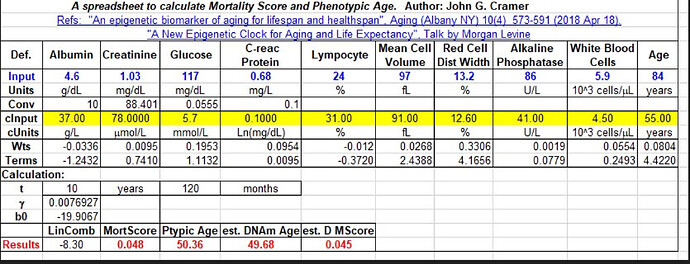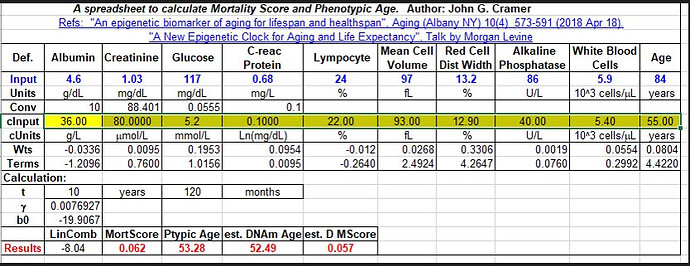You aged 3 years in 3 months?? Can you show all 9 inputs for the calculator for before and after Rapa?
The one thing I noticed is that I was waking early in the morning for about 1 hour a lot more than I usually would
having said that, the number of hours sleep I needed reduced - normally, I needed 9.5 hours to feel refreshed and on Rapa it went down to 8.5 hours.
Your albumin is at the low end. Is the CRP number correct? I calculated that 0.1 Ln(mg/dL) is about 11mg/L. Anything above 10mg/L is considered high and a sign of inflammation.
@Basil_Dev Thank you for being so generous to share this information and your blood test results, Basil. This is the type of information we can all learn from. I can imagine this blood test result is not what you were hoping for - I’m sorry to read this. Sorry for asking, since I realise you would have likely mentioned if this was the case; but there were no other apparent changes in your lifestyle in the past period?
@RapAdmin RapAdmin, are there more members that have posted elaborate pre- and post rapa blood work the past period?
A few people have shared pre and post BioAge numbers, but I wish more would share the detailed blood measures as @Basil_Dev has.
See here: Impressive Biological Age Reductions with Rapamycin (anecdotal)
no worries at all @Pat25 !
No other lifestyle changes - except I will say that I did reduce my fat intake, I was eating a lot of walnuts/olive oil, etc…
I’m going to wait a few months and see if it all comes back to Baseline.
Hi @Kandice ,
CRP is 0.1 mg/L, not mg/DL, which is in the ‘low risk’ category. Maybe I’m entering the wrong figures in the spreadsheet?
yes, Albumin has always been at the low end for me.
You shouldn’t be impressed, those are not great results. I’m puzzled by them, to be honest. While we’ve seen some people with fairly flat results, I suspect that that is for people who are already pretty well optimized (in terms of diet and physical fitness) and perhaps rapamycin in the short term doesn’t add that much at the doses we are using.
How is your general fitness level - do you exercise on a regular basis and have you continued doing so at the same rate during the three months you have been on rapamycin? Any other conditions or factors that might have impacted the outcomes?
If you take a break from rapamycin I wonder if it might bounce back better than before - please report back in either case. Perhaps wait 2 months and do another blood test and check…
Thanks for sharing the data.
What dosage are you on?
Yes,
I exercise every day, cardio 40 minutes and weights 4 X a week. This has not changed.
Diet is good, flexitarian, proteins include eggs, tofu, tempeh and kidney beans, I eat meat once a week.
Cheat day once a week but the rest of the week I stick to whole unprocessed foods.
I am forced to take a break anyway, since my last lot of Rapa was confiscated by customs. I will not be doing that again and risking going to jail.
And I can’t find a doctor in Australia who will prescribe it.
So it looks like it’s not meant to be for me…
Also, I did the blood test exactly one week after my last Rapa dose, so did not allow washout. Will take another blood test in 3 months.
Ok that’s a low dose so I’d say fluctuations in the data are just noise.
this is what happens to the mice and rats too, yet in spite of these bad results or maybe because of them rapamycin extends their life besides these lab changes are so small that they are just normal fluctuations with the margin of error, not statistically significant
Did you try this approach, with “MedMate”? See the Australia listing on our Prescribers page: Rapamycin Prescription, Doctors that Prescribe It
True. So the issue could be one of these:
- These slight changes don’t reflect the positives that are happening in underlying physiology
- The aging clocks are not detecting the key factors of lifespan extension that rapamycin enables
- These changes are temporary and would improve over time, we are just catching it too early (similar to what we see in the marmoset study… Metabolic consequences of long-term rapamycin exposure on common marmoset monkeys (Callithrix jacchus) - PMC
Or setting aside cognitive dissonance (of which I also suffer)…
- Rapamycin doesn’t work in humans
We don’t really know, do we… But we do have some interesting positive data from the transplant patients, the influenza vaccination trial and lots of positive data on the positive effects on t-cell populations in humans
Such Blasphemy on a site called “rapamycin news” ![]()
but of course It could be that rapamycin (vs. some other rapalog) is the imperfect molecule for humans and another rapalog is the answer (as the Cambian Biotech folks will argue).
Or - as we see in the rapamycin user survey - some rapamycin isn’t a good fit some percent of users (5% to 9%) based on results or side effects: Approximately 87% of Rapamycin Users Plan to Keep Using the Longevity Drug
Yes, when it comes to Rapamycin, I hold as much bias and sunk cost as anyone here but I do think we need to keep the possibility that it doesn’t work open. Put it this way, if another supplement had raised my HR and lowered my HRV so significantly I would discontinue it immediately.

